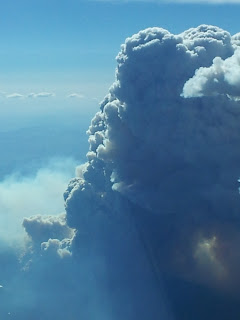By Mark W. Danielson
The mountains are a war zone, the enemy Mother Nature. From the Rockies west, everything is at risk. I have seen many wildfires while living in or
flying over mountain areas and I have never seen a fire season start like
this.
 One particularly bad fire, known as the West Fork Fire in
south Colorado, has destroyed thousands of acres and sent billowing smoke
clouds above 41000 feet. Countless
smaller fires surrounded the area with wind-whipped flames. Although this region between Alamosa and
Durango is relatively remote, homes and ski areas are either in jeopardy or
have been destroyed. The West Fork Fire
came only days after the Black Forest Fire near Colorado Springs consumed some
five hundred homes. I happened to be flying
abeam the West Fork Fire on my way across the country and snapped these shots
from 38,000 feet. I have never felt so
helpless.
One particularly bad fire, known as the West Fork Fire in
south Colorado, has destroyed thousands of acres and sent billowing smoke
clouds above 41000 feet. Countless
smaller fires surrounded the area with wind-whipped flames. Although this region between Alamosa and
Durango is relatively remote, homes and ski areas are either in jeopardy or
have been destroyed. The West Fork Fire
came only days after the Black Forest Fire near Colorado Springs consumed some
five hundred homes. I happened to be flying
abeam the West Fork Fire on my way across the country and snapped these shots
from 38,000 feet. I have never felt so
helpless.
For years, the Japanese beetle has been killing western pine
forests. Now, drought and extreme heat
have turned these timberlands into kindling. While lightning is responsible for many fires,
some, like the Black Forest Fire, were man-made. Regardless of how they start, every wildfire
requires massive resources that we can neither afford nor have.
Of course, wildfires are not limited to the United
States. In the Australian outback, wildfires
branch out in concentric circles. From
35,000 feet at night, these fires resemble large cities. Unless they threaten habitats, Australians
leave it up to nature to extinguish them.
In some remote areas of the United States, the U.S. Forest Service also
elects to do this because fire clears the underbrush and spawns new
growth. While this is not practical in
developed areas, not allowing such burns has increased the risk of conflagrations
such as the West Fork Fire. These firestorms
create their own weather patterns, often generating fire tornadoes that turn
steel into butter and vaporize animals.
Extinguishing such fires in mountain regions is extremely hazardous,
time consuming, and dependent upon Mother Nature’s cooperation.
When the smoke eventually clears, a fire’s cause is only relevant
to criminal proceedings. No words can
adequately describe an evacuee’s stress, especially when the fate of their pets
or loved ones is unknown. This summer
promises more of the same – heat, drought, lighting, wildfires. As in sports, our best defense is a good
offense. Please report all smoke. Do not discard lit cigarette butts. Only set off fireworks over water. Most importantly, thank your first-responders
for all that they do. Firefighters may
have down time, but when everything hits the fan, they lay down their lives for
us. Happy Independence Day!




4 comments:
Losing 19 firefighters in the horrible tragedy that just occurred in Arizona makes your post even more compelling and poignant. I visited my daughter and son-in-law in Denver and they showed me the devastating loss of trees in Colorado. Has it ever been like this before or is this the low point?
Naomi, it is a horrible coincidence that this post comes on the day we learn of this most recent tragedy in Arizona. There is no way to predict how bad this year will be, only that as record highs continue, we can expect worsening conditions. The most important point is to remain vigilant and realize we can all make a difference by being extra careful this year.
Thanks for such an insight into these phenomena, Mark - all the more sobering in the light of the awful news about those brave young men in Arizona. So significant, too, that there you were, high above these events thanks to an activity which was only made possible by the creative ingenuity of humans, and yet you were witnessing how helpless we can be when Nature asserts itself.
So true, Bill. I felt the same helplessness flying over Iraq while smoke billowed from oil fires -- all the result of war. Thankfully the beauty I see from the air offsets the tragedy.
Post a Comment